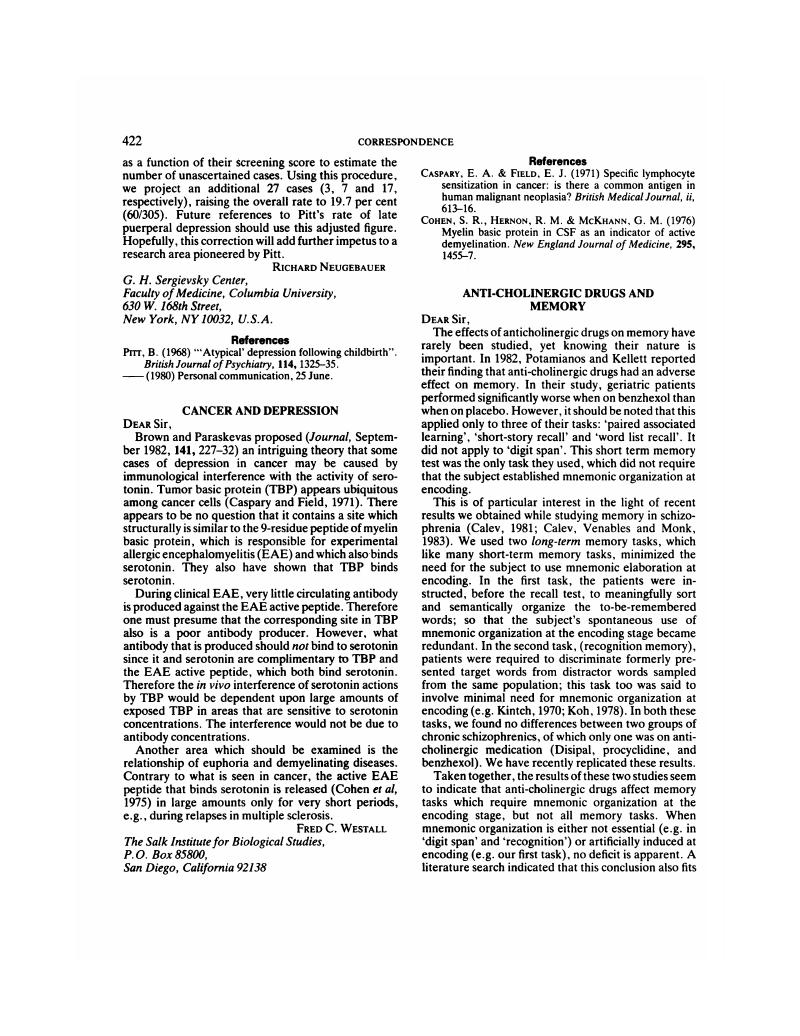Crossref Citations
This article has been cited by the following publications. This list is generated based on data provided by Crossref.
Calev, Avraham
Korin, Yaacov
Kugelmass, Sol
and
Lerer, Bernard
1987.
Performance of chronic schizophrenics on matched word and design recall tasks.
Biological Psychiatry,
Vol. 22,
Issue. 6,
p.
699.
Hogarty, Gerard E.
1991.
Social Work Practice Research on Severe Mental Illness: Charting a Future.
Research on Social Work Practice,
Vol. 1,
Issue. 1,
p.
5.
Blanchard, Jack J.
and
Neale, John M.
1992.
Medication effects: Conceptual and methodological issues in schizophrenia research.
Clinical Psychology Review,
Vol. 12,
Issue. 3,
p.
345.
Siris, Samuel G.
1993.
Adjunctive Medication in the Maintenance Treatment of Schizophrenia and its Conceptual Implications.
British Journal of Psychiatry,
Vol. 163,
Issue. S22,
p.
66.
Silver, H.
and
Geraisy, N.
1995.
Effects of Biperiden and Amantadine on Memory in Medicated Chronic Schizophrenic Patients.
British Journal of Psychiatry,
Vol. 166,
Issue. 2,
p.
241.
Borison, R.L.
1996.
The role of cognition in the risk‐benefit and safety analysis of antipsychotic medication.
Acta Psychiatrica Scandinavica,
Vol. 94,
Issue. s389,
p.
5.
Silver, Henry
and
Geraisy, Nabil
1996.
Amantadine Does not Exacerbate Positive Symptoms in Medicated, Chronic Schizophrenic Patients.
Journal of Clinical Psychopharmacology,
Vol. 16,
Issue. 6,
p.
463.
Kopala, L. C.
1996.
Spontaneous and drug‐induced movement disorders in schizophrenia.
Acta Psychiatrica Scandinavica,
Vol. 94,
Issue. s389,
p.
12.
SILVER, HENRY
and
GERAISY, NABIL
1996.
On Prescribing an Antiparkinsonian Drug.
Human Psychopharmacology: Clinical and Experimental,
Vol. 11,
Issue. 6,
p.
517.
Gilbertson, Mark W.
and
van Kammen, Daniel P.
1997.
Recent and remote memory dissociation: Medication effects and hippocampal function in schizophrenia.
Biological Psychiatry,
Vol. 42,
Issue. 7,
p.
585.
Birmingham, Luke
McClelland, Norman
and
Bradley, Caroline
1999.
Role of p.r.n. antimuscarinic medication in the treatment of antipsychotic-induced extrapyramidal movement disorders.
Psychiatric Bulletin,
Vol. 23,
Issue. 6,
p.
368.
Besche-Richard, Chrystel
Passerieux, Christine
Hardy-Baylé, Marie-Christine
Nicolas, Serge
and
Laurent, Jean-Paul
1999.
Fluency versus Conscious Recollection in Category-Production Performance: The Performance of Schizophrenic Patients.
Brain and Cognition,
Vol. 39,
Issue. 2,
p.
100.
Tracy, Joseph I
Mattson, Robert
King, Christopher
Bundick, Thomas
Celenza, Mary Anne
and
Glosser, Guila
2001.
A comparison of memory for verbal and non-verbal material in schizophrenia.
Schizophrenia Research,
Vol. 50,
Issue. 3,
p.
199.
Wykes, Til
Reeder, Clare
Williams, Clare
Corner, Julia
Rice, Christopher
and
Everitt, Brian
2003.
Are the effects of cognitive remediation therapy (CRT) durable? Results from an exploratory trial in schizophrenia.
Schizophrenia Research,
Vol. 61,
Issue. 2-3,
p.
163.
Drimer, T.
Shahal, B.
and
Barak, Y.
2004.
Effects of discontinuation of long-term anticholinergic treatment in elderly schizophrenia patients.
International Clinical Psychopharmacology,
Vol. 19,
Issue. 1,
p.
27.






eLetters
No eLetters have been published for this article.